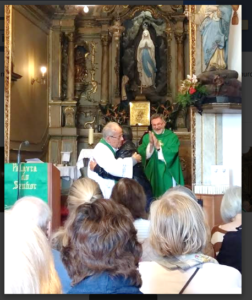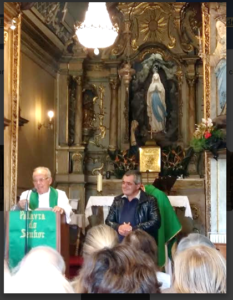– Brought to you by Fr. Bernardino Andrade (bernardinodandrade@gmail.com)

On February 11th the Catholic Church celebrated the World Day of the Sick and by coincidence the Gospel told the story of Jesus healing a leper.
In the time of Jesus there was not a more horrifying illness than leprosy. It was not just a body painfully being decomposed in life but especially the condition of being ostracized, excluded and outcast. Their loneliness was unbearable, but lepers, their family and friends had no choice according to the cruel rules of the time of Jesus.
They were accused, judged and condemned for being «sinners». According to their laws, leprosy was a punishment from God for their sins. They «deserved» to be excluded. They were «unclean». And if any person touched them, that person would become unclean. Jesus, who was a rebel against inhuman laws, in the process of healing the leper, touched him, and consequently became unclean.
During Mass on the World Day of the Sick, we reflected about today’s lepers: the «unclean» and the «untouchable» of our society. And we identified some of them like the homosexuals, the poor, the homeless, the prostitutes, the beggars and so on.

Since I started saying Mass in English at Penha de França I have been «condemned» to encounter, every Sunday, a homeless man called “Antonio”, begging for money. I never liked that and I still don’t like it. Instead of Antonio extending his hand begging for money I would prefer to see Carla dressed as a folkloric ballerina offering flowers to the tourists who attend Mass at Penha de France. It doesn’t look good, especially for the tourists.
Somebody said that «In today’s society, image is not the most important thing. Image is the only important thing». His presence «ruins» our image of «good and clean» Portuguese People.
The problem is that Jesus didn’t ask for my opinion. What he tells me is that
«Whatever you do to the least of my brothers you do it unto me» (Math. 25:40).
This is not negotiable. Then I started seeing Jesus in the person of Antonio. That’s why, before giving him some money, I always hug him. He knows that, that’s why when he sees me, before extending his hand to receive money, he extends his arms to hug me with his wonderful smile.
To experience the uncomfortable message of Jesus, at the end of the Mass two Sunday’s ago, I asked Manny and his wife Tracy to invite and escort Antonio to join me close to the altar and bless him. And blessing Antonio (a homeless and a beggar), we also blessed all the «lepers», the «untouchable» and the «unclean» of today’s society.
We blessed him and I hugged him, and I promised that any «leper» who decides to come to our church we are going to extend a red carpet to welcome him or her. They are our masters. They make us more human. That’s why I expect one day to see in every newsletter and in every news board of any Christian church this slogan: COME AS YOU ARE.
Love and Peace,
Fr. Bernardino Andrade

